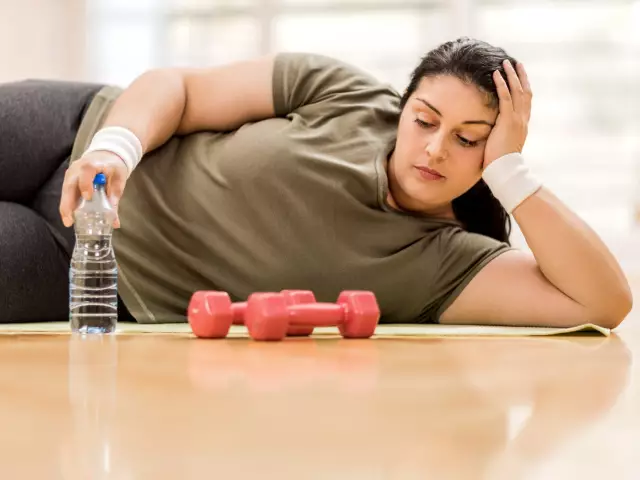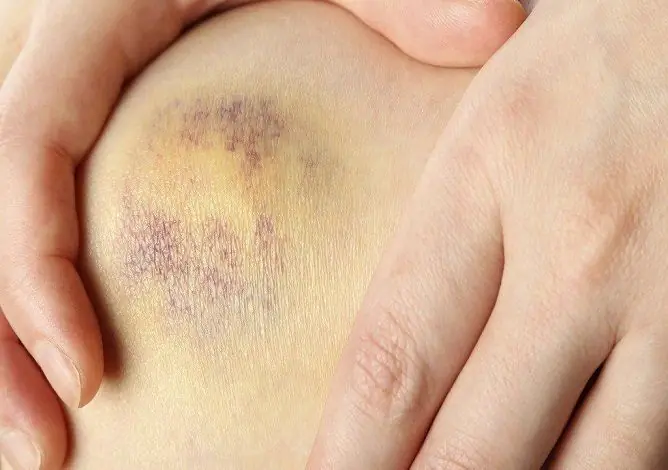- Author Rachel Wainwright wainwright@abchealthonline.com.
- Public 2023-12-15 07:39.
- Last modified 2025-11-02 20:14.
Why the body is losing fluid: 14 causes of dehydration
The human body is almost 60% water. This is so important for the normal functioning of the body that the loss of only 1.5% of the fluid already leads to the most unpleasant consequences. Problems associated with water shortage can overtake a perfectly healthy person, if, for example, he spends several hours under the scorching sun, without taking a drink with him, but it is very easy to correct health in this case. It is much more difficult to minimize the effects of dehydration if it occurs for other reasons. We will consider the most common of them in the article.
Diabetes
If the absorption of sugars fails, the concentration of glucose in the blood becomes too high. The body tries to normalize its amount by increasing urinary excretion. The patient, constantly experiencing thirst, intensively absorbs fluid, which further activates this process. It creates an unreasonable burden on the kidneys. The cells of the body, deprived of the necessary amount of fluid, begin to take it from the bloodstream, which causes further "sugar" and thickening of the blood. There is a so-called vicious circle of dehydration, which is fraught with the most sad consequences, up to the rapid death of the patient.

Source: depositphotos.com
PMS in women
In the period preceding menstruation, a woman's hormonal background changes, which leads to a decrease in the water content in the cells of the body. Fluctuations in progesterone and estrogen in the blood play an important role here. Then monthly bleeding begins, and the loss of water can be quite significant. Women are advised to consume plenty of fluids during this time, especially in the form of soothing herbal teas. They help you stay hydrated while relieving excess muscle tone and easing menstrual pain.

Source: depositphotos.com
Pregnancy
In the initial stages of gestation, women are often tormented by toxicosis, one of the signs of which is nausea or vomiting. If these episodes are repeated frequently, the body can lose significant amounts of water. In addition, many pregnant women limit their fluid intake for fear of edema. Meanwhile, the body of the expectant mother is in dire need of an increase in blood volume, and therefore in additional water.
Dehydration of a pregnant woman's body can lead not only to a deterioration in her well-being and damage to the cardiovascular or excretory system, but also to such consequences as the formation of malformations in a baby or a miscarriage.

Source: depositphotos.com
Natural feeding
A nursing mother loses a substantial amount of fluid in her milk every day. If the water deficit in the body is not actively replenished, she will have health problems. That is why women are advised to drink plenty of water, tea, milk, fruit juices and compotes during this period. This saves the body from dehydration, enhances lactation and improves the composition of breast milk.

Source: depositphotos.com
Taking medication
Most drugs designed to lower blood pressure and treat kidney and urinary tract pathologies are based on a diuretic effect. The ability to enhance diuresis is possessed by many medicinal plants traditionally used in folk medicine: lingonberry and cranberry berries, grass of the knotweed and shepherd's purse, birch buds, etc.
Patients who suffer from hypertension, cystitis, impaired renal function, edema, etc., should be warned about the need to increase the amount of fluid consumed. Otherwise, they may develop dehydration while taking medication.

Source: depositphotos.com
Low carb diets
Glucose, which the body could not use on time, accumulates in tissues in the form of glycogen. Each molecule of this substance binds three water molecules. When a person drastically reduces their carbohydrate intake, their body begins to deplete stores, losing fluid. By the way, it is the withdrawal of glycogen-related water that explains the rapid weight loss that occurs in the early stages of low-carb diets.
If the restriction of carbohydrate intake continues for more than a week, dehydration adversely affects the skin, the nervous system and the general condition of the body. It is especially harmful to exclude rice, oatmeal and durum wheat pasta from the diet: during the cooking process, they absorb water and, in addition to many useful substances, supply the body with fluid.

Source: depositphotos.com
Stress
At the time of physical or nervous overstrain in the body, aldosterone is produced - the adrenal hormone, which takes an active part in the normalization of water and electrolyte balance. Prolonged stress depletes this function, aldosterone production decreases and the body loses fluid.
Only the elimination of stress as the cause of the problem can help. Increased fluid intake in this situation has only a mild and temporary effect.

Source: depositphotos.com
Irritable bowel syndrome
About 20% of people suffer from this disease. The risk of dehydration for such patients is very high: in many of them, frequent bouts of diarrhea act as the main symptom of the disease. In addition, most patients, for fear of unpleasant symptoms, exclude a number of foods from their diet, the consumption of which increases the water content in the body.

Source: depositphotos.com
Active workouts
Sports activities improve the figure and mood, increase immunity and vitality, but can be harmful to health if approached without due care. In particular, it must be taken into account that during training, the body loses a lot of water through sweat. Therefore, it is important not only to dose physical activity, but also to replenish the fluid deficit in time.
To do this correctly, it is enough to regularly weigh yourself before and after training. For each kilogram of weight lost during exercise, you should drink from 500 to 750 ml of water (preferably mineral), a decoction of fruit or herbal tea. Drinking this much should keep the risk of dehydration to a minimum.

Source: depositphotos.com
Aging
With age, the likelihood of dehydration increases. The hormonal background changes, tissues gradually lose their ability to retain moisture. Many older people experience a decrease in fluid intake because they are less likely to feel thirsty. In such cases, experts recommend drinking water regularly at regular intervals and monitoring the amount of fluid that has entered the body during the day. This helps maintain the proper level of tissue hydration.

Source: depositphotos.com
Nutritional supplements
Even the most beneficial natural supplements can have a diuretic effect. This is the difference, for example, in parsley and dandelion leaves, celery seeds. Therefore, if you are going to consume foods of this kind, you need to consult a doctor, and then do not forget about additional drinks. As for additives of questionable composition, the side effects of which can only be guessed at, their use must be categorically abandoned.

Source: depositphotos.com
Alcohol intake
The dehydrating effect of alcohol is twofold. Firstly, it has a direct diuretic effect, and secondly, it is able to inhibit the production of certain hormones that retain fluid in the cells. The result of alcohol intake is not only a strong thirst, but also a gradual loss of water by the tissues of internal organs and skin.
Habitual drunkards very quickly reach high degrees of dehydration, in which a violation of the basic vital functions of the body is inevitable.

Source: depositphotos.com
Deficiency of vegetables and fruits in the diet
Eating fruits and vegetables with each meal provides about 2 glasses of fluid per day. It has been found that people who eat exclusively fast food, even replenishing the water deficit with drinks, are more likely to suffer from symptoms of dehydration such as dry skin and mucous membranes, brittle hair and nails. However, this may also be due to a lack of vitamins and healthy fiber.

Source: depositphotos.com
High altitude
Rest in the mountains is wonderful, but so that it does not cause deterioration in health, one must remember that when adapting to altitude, the body loses a fair amount of fluid. This is because at low atmospheric pressure, characteristic of the highlands, a person is forced to breathe more actively and more often to empty the bladder. To get used to new conditions does not lead to dehydration, you need to drink more water.

Source: depositphotos.com
Dehydration is a serious condition that can end very sadly. As a rule, the impact of not one, but several factors at once leads to serious cases. Having noticed signs of fluid deficiency, a person should urgently see a doctor in order to understand the cause of the problem and start fixing it.
YouTube video related to the article:

Maria Kulkes Medical journalist About the author
Education: First Moscow State Medical University named after I. M. Sechenov, specialty "General Medicine".
Found a mistake in the text? Select it and press Ctrl + Enter.






